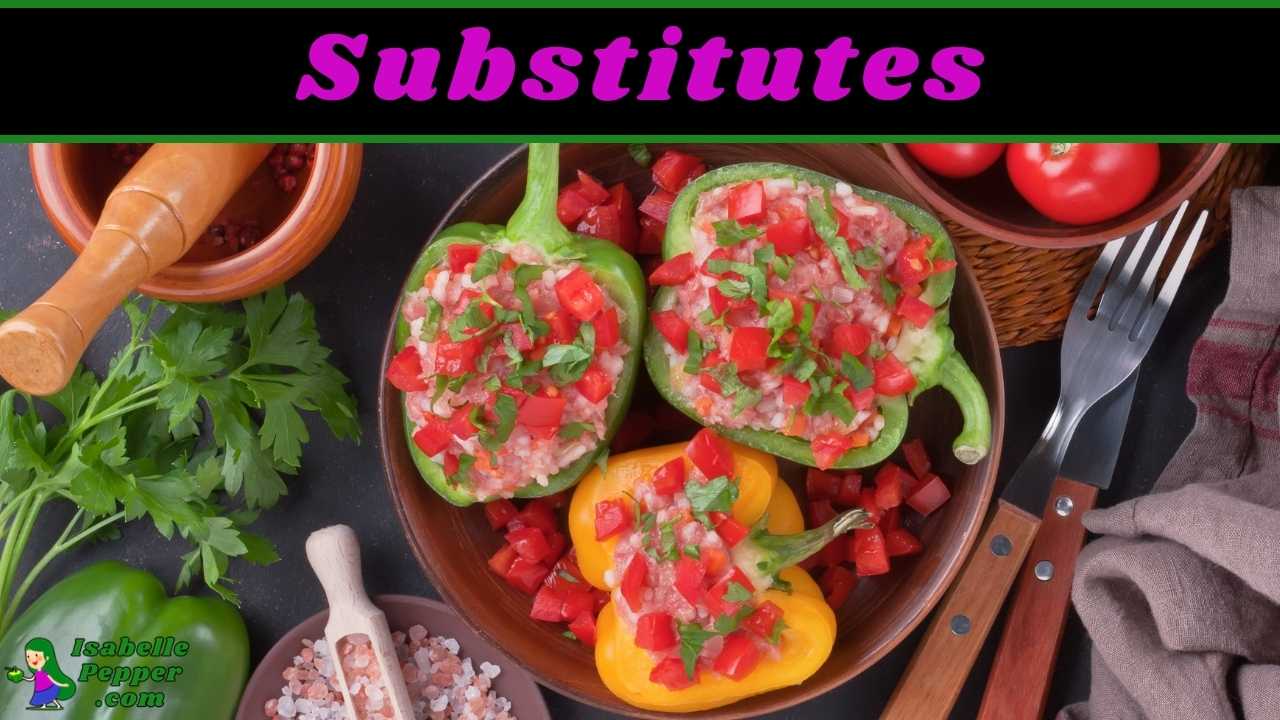When it comes to green bell peppers, opinions can be quite divided.
While some people enjoy their crispness and slightly bitter undertones, others find their flavor unappealing.
Understanding how to make green bell peppers taste better can open up a world of culinary possibilities and transform these seemingly simple vegetables into delightful components of your dishes.
In this article, we’ll delve into the science behind green bell pepper flavors, explore strategies to enhance their taste, and address common concerns about their flavor profile.

What Causes Bell Peppers to Taste Bitter?
Green bell peppers are notorious for their bitterness, often leading to mixed reviews.
However, this bitterness is a result of their unripe nature. As bell peppers mature on the plant, they undergo a transformation in flavor.
The grassy notes start to fade, giving way to a more complex and less bitter taste profile.
This is particularly noticeable in red, orange, and yellow bell peppers, which develop a sweeter and fruitier taste as they ripen.
You can learn more about the different color bell peppers here: Green vs yellow vs red bell peppers
Why do Green Bell Peppers Taste so Bad to me?
Taste sensitivity plays a significant role in how we perceive flavors, and green bell peppers are no exception.
About 25% of people are super tasters, possessing a higher number of taste buds that can detect even subtle flavors.
For some, the bitterness of green bell peppers may be more pronounced, leading to varying preferences among individuals.
Genetics also determine our sensitivity to specific bitter compounds.
An interesting experiment involves using test strips to gauge bitterness perception.
Super tasters can have up to 10 times more taste buds than those less sensitive to bitterness, shedding light on the diverse ways people experience flavors.
If you just can’t get over the taste of bell peppers and your recipe calls for it, I made an article showcasing some great alternatives. Check it out here: List of Amazing Bell Pepper Substitutes
How do you Make Green Bell Peppers Taste Better?
Instead of shying away from the bitterness, it can be used to your advantage in cooking.
Bitterness can serve as a balancing factor for rich dishes, just like acidity cuts through fatty flavors.
Green bell peppers’ bitterness complements dishes like cheesy pizzas, fajitas, and Cajun Creole cuisine, where it adds depth and contrast.
Stuffed bell peppers are a common dish, I made a guide about freezing them you can find here.
How to Make Green Bell Peppers Less Bitter?
To reduce bitterness, you can explore various cooking techniques.
Sautéing, baking, roasting, and grilling green bell peppers can help mellow their bitterness while retaining their crunchiness.
Another effective method is to use salt, which interacts with taste buds to mask bitterness.
By incorporating these strategies, you can elevate the taste of your dishes while maintaining the unique character of green bell peppers.
How to Spice up Bell Peppers
1. Spice Blends and Rubs
Utilizing pre-made spice blends or creating your own can instantly transform bell peppers.
Options like Cajun, Mexican, Mediterranean, or Indian spice blends can infuse bold and distinct flavors.
Rubbing bell peppers with these blends before roasting, grilling, or sautéing adds depth and complexity.
2. Heat Factor
Incorporating chili peppers, ranging from mild to fiery, is an excellent way to add heat to bell peppers.
Whether you opt for jalapeños, serranos, or habaneros, their varying spice levels can be balanced against the mildness of bell peppers.
Deseeding and deveining chili peppers can help control the heat.
3. Aromatics and Herbs
Aromatic ingredients like garlic, ginger, and onions can elevate bell pepper dishes.
Fresh herbs such as cilantro, basil, thyme, and rosemary add a burst of freshness and aroma.
Experiment with these elements to create layers of flavor.
4. Citrus Zest
Citrus zest, such as lemon, lime, or orange, can provide a zesty and tangy dimension to bell peppers.
Grating the outer peel and incorporating it into your dishes can brighten the flavors.
5. Nutty and Earthy Flavors
Nuts like pine nuts, almonds, and walnuts, when toasted and added to bell pepper dishes, contribute a satisfying crunch and a nutty depth of flavor.
Earthy spices like cumin and paprika can also bring warmth and richness.
6. Cheese and Umami
Enhance the savory profile of bell peppers with umami-rich ingredients like Parmesan, feta, or goat cheese.
The combination of sweet bell peppers and savory cheeses creates a harmonious balance.
7. Marination
Marinating bell peppers in a blend of olive oil, vinegar, herbs, and spices allows them to absorb intense flavors.
Grilled or roasted marinated bell peppers can be used in salads, sandwiches, or as a side dish.
If you really want a delicious bell pepper dish, I found this great recipe you can use: https://www.onceuponachef.com/recipes/caramelized-onion-and-bell-pepper-medley.html
FAQs
Why are green bell peppers tasteless?
Green bell peppers are often perceived as tasteless because they are unripe versions of mature peppers.
Their flavor profile is milder and slightly bitter due to the absence of certain compounds found in ripe peppers.
Additionally, the lack of capsaicin, the heat compound found in spicier peppers, contributes to their subtle taste.
Cooking methods, pairings, and individual taste sensitivity also play roles in their perceived flavor.
Why are my bell peppers not sweet?
Several factors can contribute to bell peppers not tasting sweet:
Ripeness: Bell peppers develop sweetness as they ripen. If harvested prematurely, especially green ones, they may lack the desired sweetness.
Variety: Different bell pepper varieties have varying levels of sweetness. Some are naturally sweeter than others.
Growing Conditions: Environmental factors like temperature, sunlight, and soil quality can affect sugar development in bell peppers.
Harvest Timing: Picking bell peppers at the right time, when they are fully ripe, ensures optimal sweetness.
Storage: Improper storage conditions can cause bell peppers to lose their sweetness over time.
Cooking Methods: Certain cooking methods can break down sugars, reducing sweetness. Quick cooking methods can help retain sweetness.
Genetics: Some people are more sensitive to bitter compounds in bell peppers, which can mask their sweetness.
How do you get the most flavor out of bell peppers?
To enhance the flavor of bell peppers, opt for ripe peppers with vibrant colors, as they tend to be sweeter.
Experiment with various cooking techniques such as roasting, grilling, or sautéing to bring out their natural sweetness and add a touch of smokiness.
Sautéing bell peppers with aromatic ingredients like garlic and onions can amplify their taste.
Pairing them with foods like tomatoes, onions, and herbs can also enhance their flavor profile.
For an extra kick, try marinating bell peppers with a blend of herbs, spices, and a splash of lemon or vinegar.
By utilizing these techniques and incorporating them into your dishes, you can savor the full, delicious taste of bell peppers.
Conclusion
The journey from bitter to better with green bell peppers is a rewarding one.
By understanding the science behind their flavor, harnessing cooking techniques, and accommodating diverse taste perceptions, you can transform green bell peppers into a culinary asset.
Experiment with different recipes, methods, and pairings to create dishes that not only satisfy your taste buds but also highlight the unique characteristics of these vibrant vegetables.





